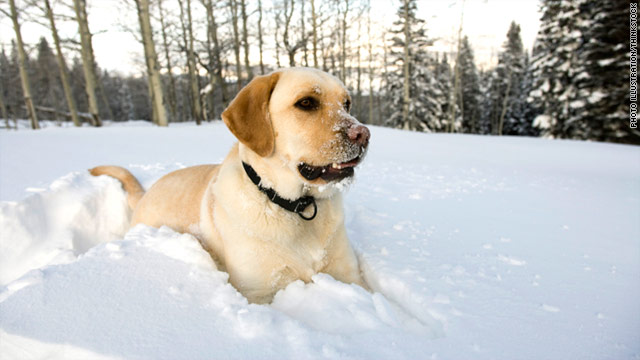A winter checklist for pets
(Mother Nature Network) — As the temperatures plunge, I do a bunch of things around the house to help my family adjust to the cooler temps — dig out sweaters and mittens, close the attic vents, and bulk up on soups and hot chocolate for snow days. It’s a heck of a lot easier to ride out the cold when you have warm clothes, a warm house and a warm belly.
But what about my pets? My 11-year-old black lab/mastiff mix puppy gets special care in the winter months, too. For starters, we keep him inside a lot more (he graces the outdoors to pee and bark at the mail lady) and we bring his water dish indoors to make sure it doesn’t freeze.
Here are some more tips for keeping pets safe and healthy all winter long:
Watch the temp. It is easy to think that their fur coats will keep pets warm in the winter, but in reality, pets get cold outside just as easily as we do. If your pet is sensitive to cold, keep him inside. The Sacramento SPCA recommends that short-haired dogs, cats and puppies be kept indoors when the temperature dips below 40 degrees Fahrenheit; all other pets should come in when temps fall below 20 degrees Fahrenheit.
MNN: Study reveals physics of how cats drink
Slap the hood. Cats and other critters seek refuge from winter winds wherever they can, sometimes snuggling up to your car’s engine to soak up a little warmth. Make it a practice to slap the hood of your car before starting it to give them a chance to wake up and escape.
Keep ’em leashed. Animals can easily lose their scent in winter months, especially when snow covers the ground. So keep your dog on a leash when you’re in an unfamiliar area. Also, make sure his ID tags are up to date as more pets are lost during the winter than during any other season.
Change your antifreeze. Cats and dogs are attracted to the sweet smell and taste of antifreeze, and will often sample it if they find a puddle on the sidewalk or garage floor. Unfortunately, regular antifreeze, or ethylene glycol, is highly toxic to pets. Be sure to thoroughly clean up any spills from your vehicle, and consider using a brand made from propylene glycol instead.
MNN: How to find a place to board your pet
Wipe ’em down. Ice-melting chemicals can irritate and burn the pads of your pet’s feet and can cause serious illness if swallowed (or licked). Be sure wipe down her belly, legs, and paws to remove these chemicals if she’s spent anytime outdoors.
Break the ice. Sure you may have filled up your pet’s water bowl in the morning, but did it turn in to a block of ice by lunch? Check your pet’s water bowl frequently and break the ice if necessary to make sure he has access to clean, fresh water.
Make sure your pet has a warm place to rest, whether she stays indoors or out, as well as plenty of fresh water. That will go a long way towards keeping her safe, healthy and happy all winter long.
Want more tips? Get pet information and advice at MNN.com






